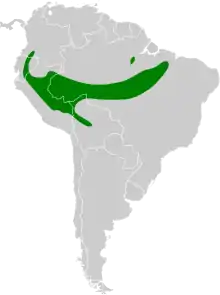| Yellow-shouldered grosbeak | |
|---|---|
 | |
| In Yasuni National Park, | |
| Scientific classification | |
| Domain: | Eukaryota |
| Kingdom: | Animalia |
| Phylum: | Chordata |
| Class: | Aves |
| Order: | Passeriformes |
| Family: | Thraupidae |
| Genus: | Parkerthraustes Remsen, 1997 |
| Species: | P. humeralis |
| Binomial name | |
| Parkerthraustes humeralis (Lawrence, 1867) | |
 | |
| Synonyms | |
| |
The yellow-shouldered grosbeak (Parkerthraustes humeralis) is a species of bird in the tanager family Thraupidae. It is the only member of its genus Parkerthraustes. It is found in Bolivia, Brazil, Colombia, Ecuador, and Peru. Its natural habitat is subtropical or tropical moist lowland forests.
Taxonomy
The yellow-shouldered grosbeak was formally described in 1867 by the American amateur ornithologist George Newbold Lawrence. He coined the Latin name Pytilus (Caryothrautes) humeralis.[2] The species was moved to its own genus Parkerthraustes in 1997 by James Van Remsen Jr. The genus name was chosen to honour the memory of the American ornithologist Theodore A. Parker III who had died in an airplane accident.[3][4] The specific epithet humeralis is Late Latin meaning "of the shoulders".[5]
The yellow-shouldered grosbeak was traditionally considered a member of the cardinal family Cardinalidae.[6] It was moved to the tanager family based on the results of a molecular phylogenetic study published in 2007.[7][8] It is placed in the subfamily Orchesticinae with the brown tanager in its own genus Orchesticus.[9] The species is monotypic: no subspecies are recognised.[8]
References
- ↑ BirdLife International (2018). "Parkerthraustes humeralis". IUCN Red List of Threatened Species. 2018: e.T22723834A132169375. doi:10.2305/IUCN.UK.2018-2.RLTS.T22723834A132169375.en. Retrieved 11 November 2021.
- ↑ Lawrence, George Newbold (1867). "Descriptions of new species of American Birds". Annals of the Lyceum of Natural History of New York. 8: 466–482 [467–468]. doi:10.1111/j.1749-6632.1867.tb00333.x.
- ↑ Remsen, Jr., J. V. (1997). "A new genus for the yellow-shouldered grosbeak" (PDF). Studies in Neotropical Ornithology Honoring Ted Parker. Ornithological Monographs. Vol. 48. Washington, DC: The American Ornithologist's Union. pp. 89–90. doi:10.2307/40157528. JSTOR 40157528.
- ↑ Bates, John M.; Schulenberg, Thomas S. (1997). "In Memoriam: Theodore A. Parker III, 1953–1993" (PDF). The Auk. 114 (1): 110. doi:10.2307/4089070. JSTOR 4089070.
- ↑ Jobling, James A. (2010). The Helm Dictionary of Scientific Bird Names. London: Christopher Helm. p. 196. ISBN 978-1-4081-2501-4.
- ↑ Paynter, Raymond A. Jr, ed. (1970). Check-List of Birds of the World. Vol. 13. Cambridge, Massachusetts: Museum of Comparative Zoology. p. 226.
- ↑ Klicka, J.; Burns, K.; Spellman, G. M. (December 2007). "Defining a monophyletic Cardinalini: A molecular perspective". Molecular Phylogenetics and Evolution. 45 (3): 1014–1032. doi:10.1016/j.ympev.2007.07.006. PMID 17920298.
- 1 2 Gill, Frank; Donsker, David; Rasmussen, Pamela, eds. (July 2020). "Tanagers and allies". IOC World Bird List Version 10.2. International Ornithologists' Union. Retrieved 22 November 2020.
- ↑ Burns, K.J.; Shultz, A.J.; Title, P.O.; Mason, N.A.; Barker, F.K.; Klicka, J.; Lanyon, S.M.; Lovette, I.J. (2014). "Phylogenetics and diversification of tanagers (Passeriformes: Thraupidae), the largest radiation of Neotropical songbirds". Molecular Phylogenetics and Evolution. 75: 41–77. doi:10.1016/j.ympev.2014.02.006. PMID 24583021.
